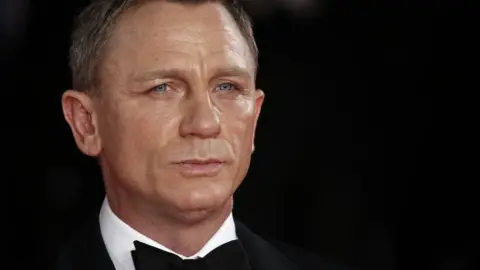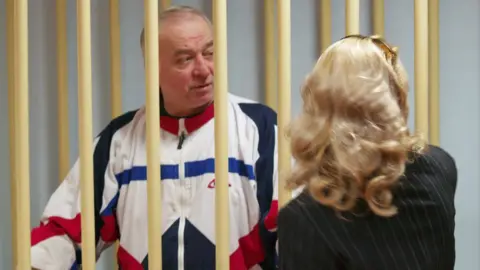When is a diplomat really just a spy?
 Getty Images
Getty ImagesTheresa May says the 23 Russian diplomats kicked out of Britain are "undeclared intelligence officers".
In other words, they're "spies".
This might surprise anyone who thought the key requirements for being a good diplomat were a firm handshake, a decent backhand and the ability to order a gin and tonic in several languages.
So where do you draw the line between official diplomacy and the murky world of espionage?
"Every embassy in the world has spies," says Prof Anthony Glees, director of the Centre for Security and Intelligence Studies at the University of Buckingham.
And because every country does it, he says there's "an unwritten understanding" that governments are prepared to "turn a blind eye" to what goes on within embassies.
But that understanding only goes so far - it ends if something obviously illegal takes place.
"That's why the poisoning of [former spy] Sergei Skripal and his daughter is such a problem," says Prof Glees.
Of course, not all embassy staff are up to no good.
Genuine diplomats gather information using entirely legal methods and stick to the code set out in the 1961 Vienna Convention.
Their work centres on three main areas. They're listed by the British Government as:
Political - monitoring developments in the country the embassy is based and representing Britain in government and the media.
Commercial - helping British companies to trade overseas and promote British investment.
Consular - helping British citizens in other countries and processing UK visa applications.
"There are genuine diplomats," agrees Prof Glees.
"But some people are listed as diplomats but are actually intelligence officers. Every country does it."
It's these officers who are responsible for the secret gathering of intelligence.
"The actual spying is done by an agent - who can be paid for, blackmailed, or who's doing it for ideological reasons," says Prof Glees.
"The officers at embassies are responsible for running the agents. They won't have got their hands dirty themselves."
 Moscow District Military Court/TASS
Moscow District Military Court/TASSWhich brings us back to all the Russian diplomats kicked out by Britain and by over 25 other countries around the world.
Theresa May made clear she believed they were spies. And that's why the action could damage Russia.
"I keep being asked if we're safer in the UK because of these expulsions," explains Prof Glees.
"Undoubtedly yes. This is a big, bit hit on Russia's intelligence operation.
"But there will still be agents, waiting for someone else to come and run them because we won't have got hold of them."
